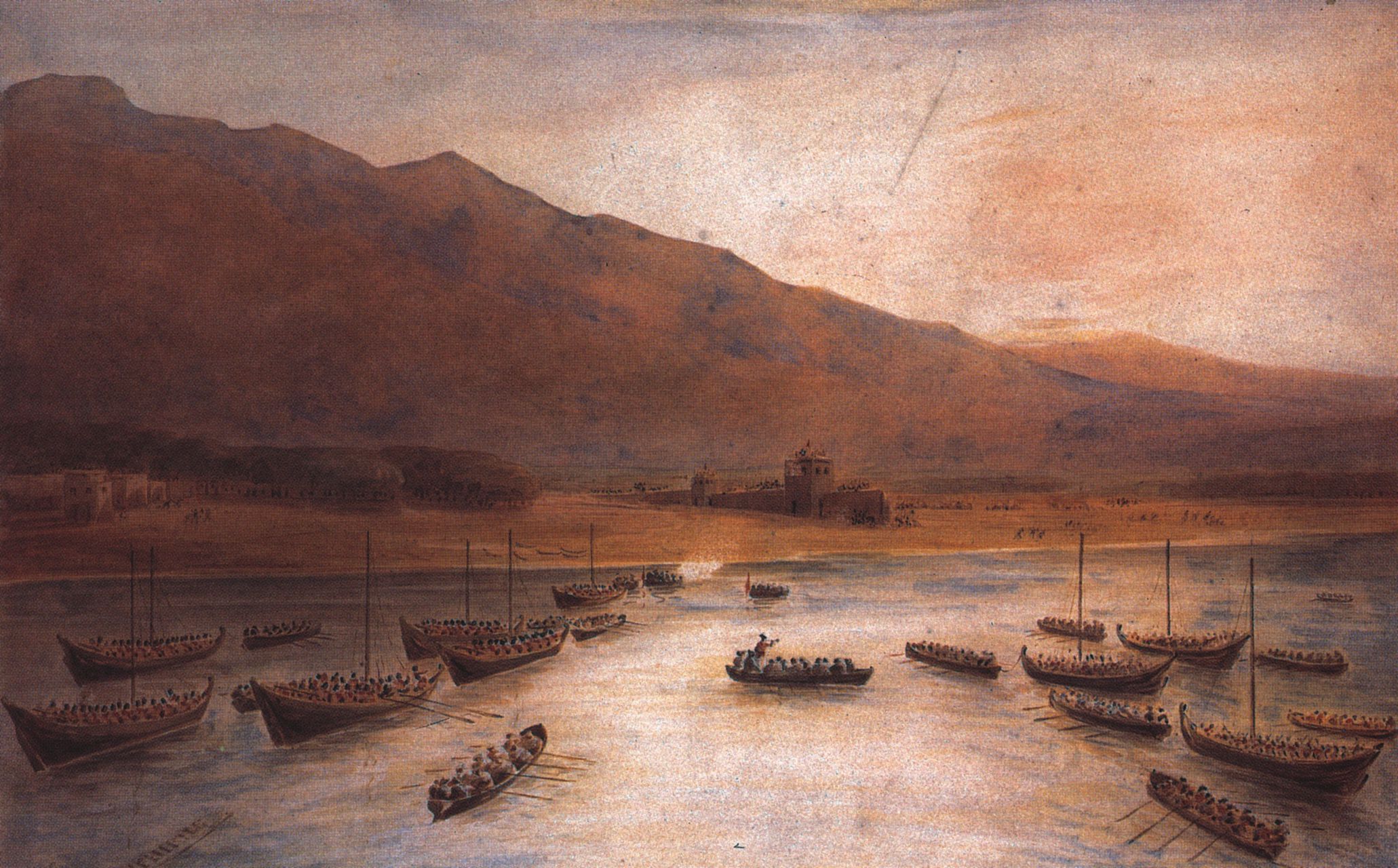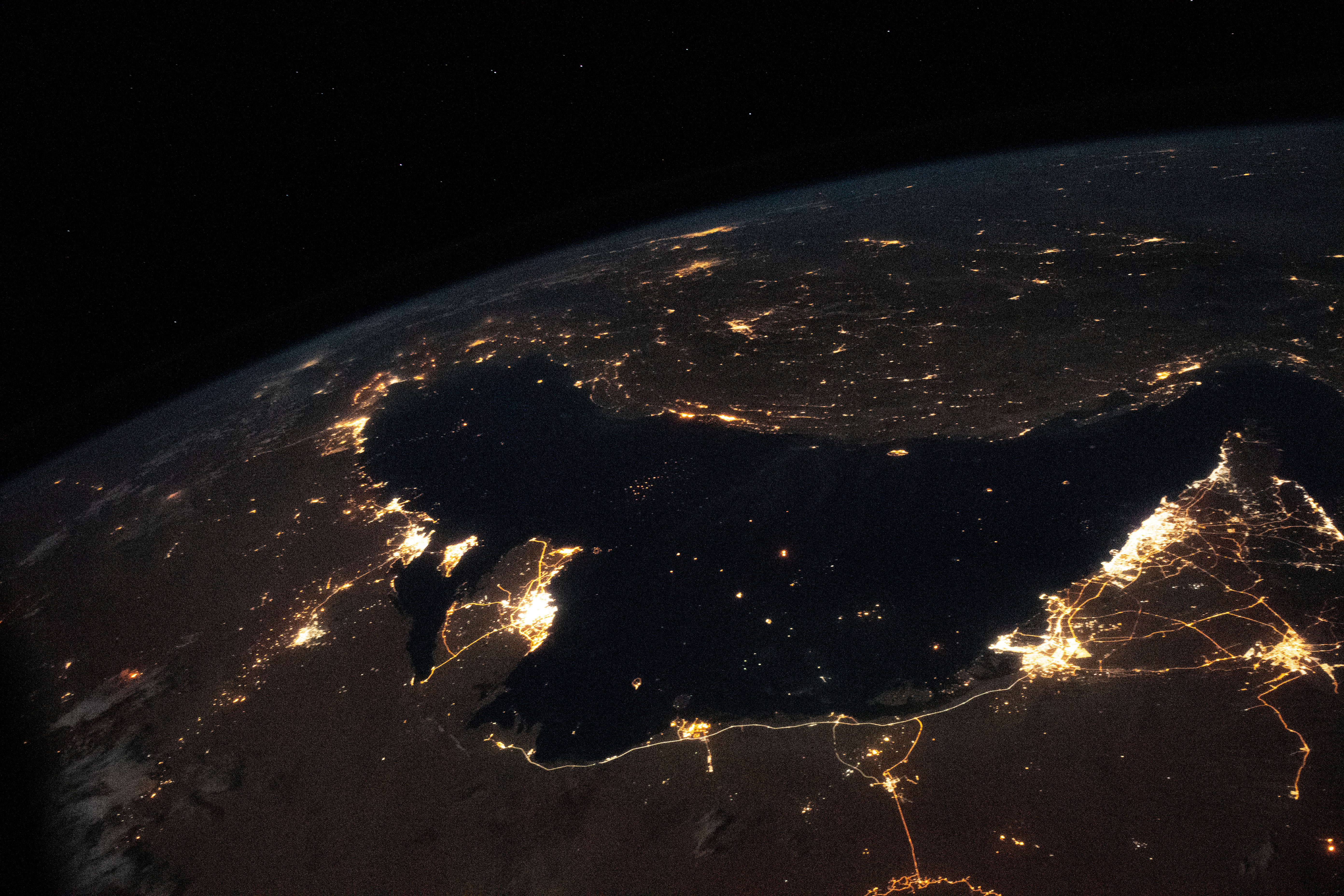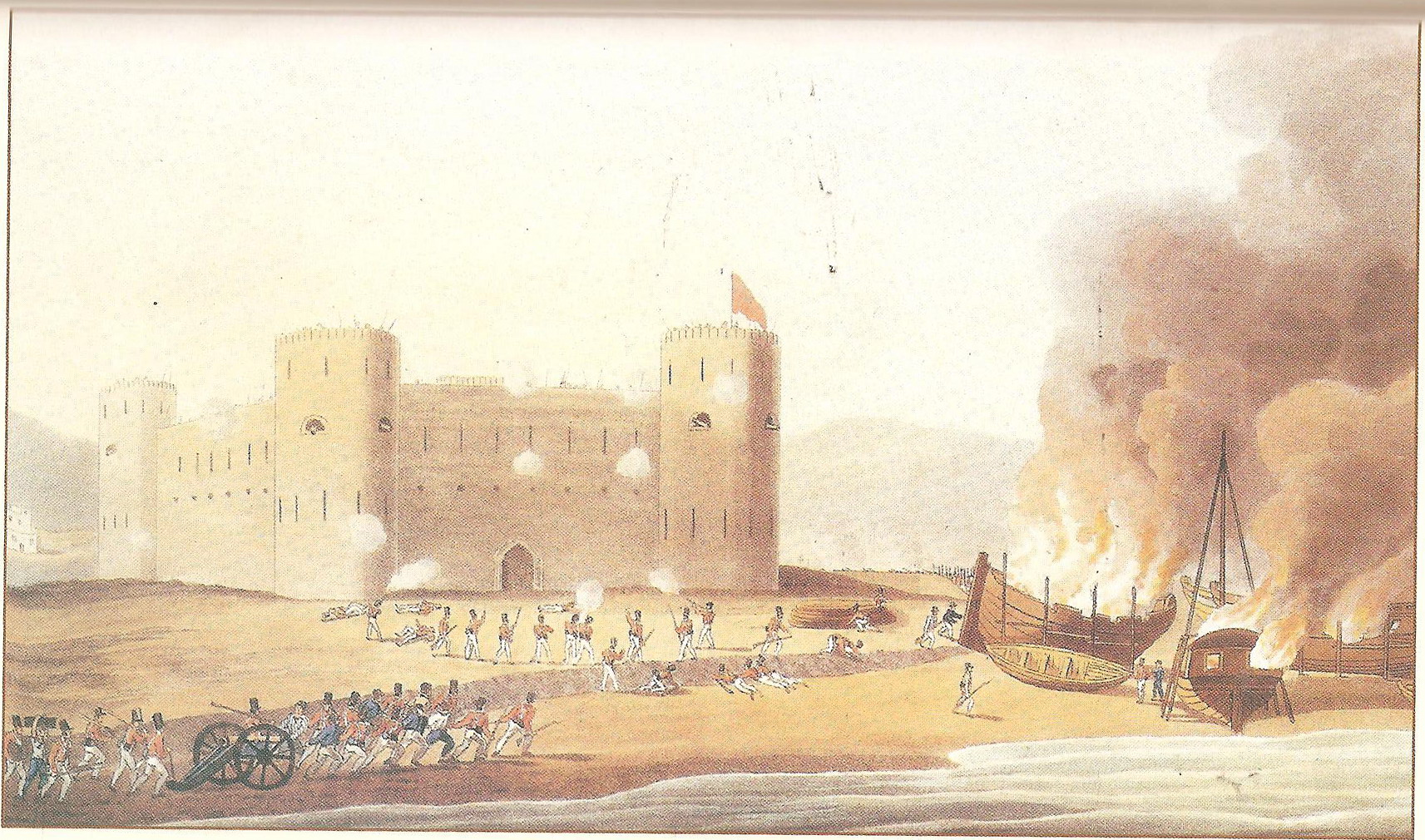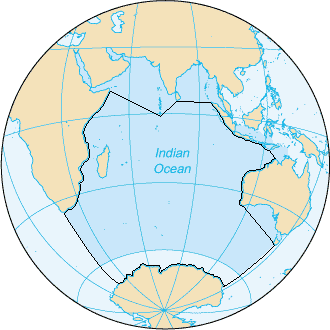|
Sultan Bin Saqr Al Qasimi
Sheikh Sultan bin Saqr Al Qasimi (1781–1866) was the Sheikh of the Qawasim and ruler variously of the towns of Sharjah and Ras Al Khaimah, Jazirah Al Hamra and Rams, all Trucial States in their time and now part of the United Arab Emirates. Briefly a dependent of the first Saudi Kingdom, his rule over Ras Al Khaimah ran from 1803–1809, when he was deposed by order of the Saudi Amir and restored in 1820, going on to rule until his death in 1866 at the age of 85. He was Ruler of Sharjah from 1814–1866, with a brief disruption to that rule in 1840 by his elder son Saqr. He was a signatory to various treaties with the British, starting with the General Maritime Treaty of 1820 and culminating in the Perpetual Maritime Truce of 1853. Rule A characteristic of Sultan's rule is that he placed relatives as '' walis'' or headmen of the emirates under his rule and so Ras Al Khaimah was effectively ruled by Mohammed bin Saqr, Sultan's brother, from 1823 until his death in 1845, while ... [...More Info...] [...Related Items...] OR: [Wikipedia] [Google] [Baidu] |
Sheikh
Sheikh (pronounced or ; ar, شيخ ' , mostly pronounced , plural ' )—also transliterated sheekh, sheyikh, shaykh, shayk, shekh, shaik and Shaikh, shak—is an honorific title in the Arabic language. It commonly designates a chief of a tribe or a royal family member in Arabian countries, in some countries it is also given to those of great knowledge in religious affairs as a surname by a prestige religious leader from a chain of Sufi scholars. It is also commonly used to refer to a Muslim religious scholar. It is also used as an honorary title by people claiming to be descended from Hasan ibn Ali and Husayn ibn Ali both patrilineal and matrilineal who are grandsons of the Islamic prophet Muhammad. The term is literally translated to "Elder" (is also translated to "Lord/ Master" in a monarchical context). The word 'sheikh' is mentioned in the 23rd verse of Surah Al-Qasas in the Quran. Etymology and meaning The word in Arabic stems from a triliteral root connected wit ... [...More Info...] [...Related Items...] OR: [Wikipedia] [Google] [Baidu] |
Persian Gulf
The Persian Gulf ( fa, خلیج فارس, translit=xalij-e fârs, lit=Gulf of Fars, ), sometimes called the ( ar, اَلْخَلِيْجُ ٱلْعَرَبِيُّ, Al-Khalīj al-ˁArabī), is a mediterranean sea in Western Asia. The body of water is an extension of the Indian Ocean located between Iran and the Arabian Peninsula.United Nations Group of Experts on Geographical NameWorking Paper No. 61, 23rd Session, Vienna, 28 March – 4 April 2006. accessed October 9, 2010 It is connected to the Gulf of Oman in the east by the Strait of Hormuz. The Shatt al-Arab river delta forms the northwest shoreline. The Persian Gulf has many fishing grounds, extensive reefs (mostly rocky, but also coral), and abundant pearl oysters, however its ecology has been damaged by industrialization and oil spills. The Persian Gulf is in the Persian Gulf Basin, which is of Cenozoic origin and related to the subduction of the Arabian Plate under the Zagros Mountains. The current f ... [...More Info...] [...Related Items...] OR: [Wikipedia] [Google] [Baidu] |
Hassan Bin Rahma Al Qasimi
Hassan bin Rahma Al Qasimi was the Sheikh (ruler) of Ras Al Khaimah from 1814–1820. He was accused by the British of presiding over a number of acts of maritime piracy, an assertion he denied. Despite signing a treaty of peace with the British in October 1814, a punitive expeditionary force was mounted against Ras Al Khaimah in December 1819 and Hassan bin Rahma was removed as Sheikh of Ras Al Khaimah, which he ceded to the British in a preliminary agreement to the General Maritime Treaty of 1820. Rule The nephew of the Ruler of Emirate of Ras Al Khaimah, Sultan bin Saqr Al Qasimi, Hassan bin Rahma emerged as the de facto Ruler of Ras Al Khaimah in 1814, although it is likely his rule started before this time. He was a dependent of the ruler of the first Saudi state, Abdulla Ibn Saud (and his father Saud bin Abdulaziz before him). During a visit to Abdulla in Riyadh in August 1814, Hassan bin Rahma received a letter from the British Resident at Bushire accusing him of ... [...More Info...] [...Related Items...] OR: [Wikipedia] [Google] [Baidu] |
Bandar Lengeh
Bandar Lengeh ( fa, بندرلنگه, also Romanized as Bandar-e Lengeh, Bandar-e-Langeh and Bandar Langeh; also known simply as Lengeh, Linja, Linjah or Lingah) is a harbour city and capital of Bandar Lengeh County, in Hormozgan province of Iran on the coast of the Persian Gulf. The harbor is from Lar, from Bandar Abbas, and from Bushehr. The weather in Bandar Lengeh is hot and humid, typical of coastal cities in southern Iran. At the 2006 census, its population was 25,303, in 5,589 families. History Lengeh was a center for trade between Oman and Iran for over 60 years, from 1759 to 1814. After 1814, Bandar Abbas played a major role in regional trade. Language The linguistic composition of the city: Gallery file:BandarLengeh-Beach-2.jpg, file:BandarLengeh-Beach-1.jpg, file:Fekri-Historical-House-1.jpg, file:BandarLengeh-Historical-House.jpg, file:Bandar-Lengeh-Mosque.jpg, File:BandarLengeh-Badgir.jpg, File:EbneAbbas-Mosque-BandarLengeh.jpg, Climate B ... [...More Info...] [...Related Items...] OR: [Wikipedia] [Google] [Baidu] |
British Troops Landing At Ras Al Khaimah 1809 By J
British may refer to: Peoples, culture, and language * British people, nationals or natives of the United Kingdom, British Overseas Territories, and Crown Dependencies. ** Britishness, the British identity and common culture * British English, the English language as spoken and written in the United Kingdom or, more broadly, throughout the British Isles * Celtic Britons, an ancient ethno-linguistic group * Brittonic languages, a branch of the Insular Celtic language family (formerly called British) ** Common Brittonic, an ancient language Other uses *''Brit(ish)'', a 2018 memoir by Afua Hirsch *People or things associated with: ** Great Britain, an island ** United Kingdom, a sovereign state ** Kingdom of Great Britain (1707–1800) ** United Kingdom of Great Britain and Ireland (1801–1922) See also * Terminology of the British Isles * Alternative names for the British * English (other) * Britannic (other) * British Isles * Brit (other) * Briton (d ... [...More Info...] [...Related Items...] OR: [Wikipedia] [Google] [Baidu] |
Indian Ocean
The Indian Ocean is the third-largest of the world's five oceanic divisions, covering or ~19.8% of the water on Earth's surface. It is bounded by Asia to the north, Africa to the west and Australia to the east. To the south it is bounded by the Southern Ocean or Antarctica, depending on the definition in use. Along its core, the Indian Ocean has some large marginal or regional seas such as the Arabian Sea, Laccadive Sea, Bay of Bengal, and Andaman Sea. Etymology The Indian Ocean has been known by its present name since at least 1515 when the Latin form ''Oceanus Orientalis Indicus'' ("Indian Eastern Ocean") is attested, named after India, which projects into it. It was earlier known as the ''Eastern Ocean'', a term that was still in use during the mid-18th century (see map), as opposed to the ''Western Ocean'' ( Atlantic) before the Pacific was surmised. Conversely, Chinese explorers in the Indian Ocean during the 15th century called it the Western Oceans. In Ancie ... [...More Info...] [...Related Items...] OR: [Wikipedia] [Google] [Baidu] |
Said Bin Sultan
Sayyid Saïd bin Sultan al-Busaidi ( ar, سعيد بن سلطان, , sw, Saïd bin Sultani) (5 June 1791 – 19 October 1856), was Sultan of Muscat and Oman, the fifth ruler of the Busaid dynasty from 1804 to 4 June 1856. His rule commenced following the death of his father, Sultan bin Ahmad, in November 1804 and a period of conflict and internecine rivalry of succession that followed. He is often referred to as the Lion of Oman (''Asaad al Uman''), as one of the greatest Omani sultans. Said's uncle Qais bin Ahmad finally agreed to Said's primacy following Said's killing of his cousin, Badar bin Saif, a pretender to the throne. He is noted for having moved his capital to Zanzibar, during which time the Omani Empire reached the zenith of its power and wealth. Early years Said bin Sultan was son of Sultan bin Ahmed, who ruled Oman from 1792 to 1804. Sultan bin Ahmed died in 1804 on an expedition to Basra. He appointed Mohammed bin Nasir bin Mohammed al-Jabry as the Regent an ... [...More Info...] [...Related Items...] OR: [Wikipedia] [Google] [Baidu] |
Muscat
Muscat ( ar, مَسْقَط, ) is the capital and most populated city in Oman. It is the seat of the Governorate of Muscat. According to the National Centre for Statistics and Information (NCSI), the total population of Muscat Governorate was 1.4 million as of September 2018. The metropolitan area spans approximately and includes six provinces called . Known since the early 1st century AD as an important trading port between the west and the east, Muscat was ruled by various indigenous tribes as well as foreign powers such as the Persians, the Portuguese Empire and the Ottoman Empire at various points in its history. A regional military power in the 18th century, Muscat's influence extended as far as East Africa and Zanzibar. As an important port-town in the Gulf of Oman, Muscat attracted foreign tradesmen and settlers such as the Persians, Balochis and Sindhis. Since the ascension of Qaboos bin Said as Sultan of Oman in 1970, Muscat has experienced rapid infrastructural d ... [...More Info...] [...Related Items...] OR: [Wikipedia] [Google] [Baidu] |
Mokha
Mokha ( ar, المُخا, al-Mukhā), also spelled Mocha, or Mukha, is a port city on the Red Sea coast of Yemen. Until Aden and al Hudaydah eclipsed it in the 19th century, Mokha was the principal port for Yemen's capital, Sanaa. Long known for its coffee trade, the city gave its name to Mocha coffee and chocolate. Overview Mocha was the major marketplace for coffee ('' Coffea arabica'') from the 15th century until the early 18th century. Even after other sources of coffee were found, ''Mocha'' beans (also called ''Sanani'' or ''Mocha Sanani'' beans, meaning ''from Sana'a'') continued to be prized for their distinctive flavor—and remain so even today. The coffee itself did not grow in Mocha, but was transported from places inland to the port in Mocha, where it was shipped abroad. Mocha's coffee legacy is reflected in the name of the mocha latte and the Moka pot coffee maker. In Germany, traditional Turkish coffee is known as Mokka. According to the Portuguese ... [...More Info...] [...Related Items...] OR: [Wikipedia] [Google] [Baidu] |
Yemen
Yemen (; ar, ٱلْيَمَن, al-Yaman), officially the Republic of Yemen,, ) is a country in Western Asia. It is situated on the southern end of the Arabian Peninsula, and borders Saudi Arabia to the Saudi Arabia–Yemen border, north and Oman to the Oman–Yemen border, northeast and shares maritime borders with Eritrea, Djibouti, and Somalia. Yemen is the second-largest Arabs, Arab sovereign state in the peninsula, occupying , with a coastline stretching about . Its constitutionally stated Capital city, capital, and largest city, is Sanaa. As of 2021, Yemen has an estimated population of some 30.4 million. In ancient times, Yemen was the home of the Sabaeans, a trading state that included parts of modern-day Ethiopia and Eritrea. Later in 275 AD, the Himyarite Kingdom was influenced by Judaism. Christianity arrived in the fourth century. Islam spread quickly in the seventh century and Yemenite troops were crucial in the early Islamic conquests. Several Dynasty, dynasties ... [...More Info...] [...Related Items...] OR: [Wikipedia] [Google] [Baidu] |
Diriyah
Diriyah ( ar, الدِرْعِيّة), formerly romanized as Dereyeh and Dariyya), is a town in Saudi Arabia located on the north-western outskirts of the Saudi capital, Riyadh. Diriyah was the original home of the Saudi royal family, and served as the capital of the Emirate of Diriyah under the first Saudi dynasty from 1727 to 1818. Today, the town is the seat of the Diriyah Governorate, which also includes the villages of Uyayna, Jubayla, and Al-Ammariyyah, among others, and is part of Ar Riyad Province. The Turaif district, the first capital of Saudis, in Diriyah was declared a UNESCO World Heritage Site in 2010. The layout of the city itself can be easily studied in the National Museum of Saudi Arabia with the help of a large-scale detailed model of the city on display there. Diriyah also hosts the Diriyah ePrix. Location The ruins of the old city of Diriyah lay on either side of the narrow valley known as Wadi Hanifa, which continues southwards through Riyadh and beyond ... [...More Info...] [...Related Items...] OR: [Wikipedia] [Google] [Baidu] |
Al Bithnah Fort
Bithnah Fort is a traditional double story rock, coral and mudbrick fortification located in the Wadi Ham, near the village of Bithnah in Fujairah, United Arab Emirates. The fort has played a significant role in the history of the Emirates, particularly in the emergence of Fujairah as an independent emirate in the early 20th century. With a controlling position overlooking the Wadi Ham, the fort replaced an Iron Age fortification. Prior to the construction of the metalled road between Fujairah City and Masafi in the 1970s, traffic to the interior from the coast passed through the bed of the wadi, controlled by Bitnah Fort, which has through the ages been a keenly contested strategic holding and was to form a key mainstay in the fortunes of the Sharqiyin through the 18th and early 19th centuries. The fort Bithnah Fort is a rectangular construction with two round corner towers. A rectangular guard's room gives the outward appearance of forming a third tower. It is principally ... [...More Info...] [...Related Items...] OR: [Wikipedia] [Google] [Baidu] |






.jpg)